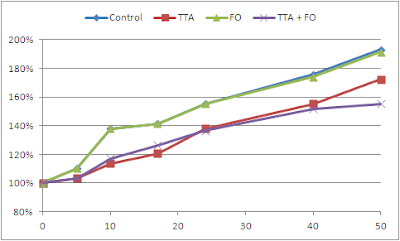While TTA works well, but has well-known side-effects,...
A recent long-duration rodent study that was conducted by a group of European researchers and which my friend Sean Casey from CasePerformance has brought back up onto my radar (Vigerust. 2012), did now investigate the long term (50 weeks) effects of supplemental tetradecylthioacetic acid and another purportedly saver PPAR-agonist, with similarly beneficial effects on triglycerides yet hardly noticeable effects on weight management - my all-time favorite fish oil! To this extend, the scientist kept their rats on their infamous interpretation of a "high fat" diet, which, as you will probably already have expected, had a moderate fat content of 25% tons of carbs and little protein and had thusly more of the standard American diet than of what people in the bloggosphere usually refer to as a "high fat" diet, i.e. a diet that is really high in fat (>50%) and low in carbohydrates.
 |
| Figure 1: Relative body weight (compared to identical baseline) in rats at different time points during 50 weeks on high fat diet (control) with either TTA, fish oil or both (data calculated based on Vigerust. 2012). |
 |
| Figure 2: Relative expression of uncoupling protein 3 (UCP3, primary axis) and enzymes involved in fatty acid metabolism (secondary axis) at the end of the 50-week dietary intervention; expressed relative to high fat control (data calculated based on Vigerust. 2012). |
....fish oil hardly works and has less-known side-effects
In that, it is important to note, that only TTA (respectively its addition to FO), not fish oil, was able to reduce the diet-induced elevations in hepatic triacylglycerol (TAG) levels. This leads to scientists to speculate, that despite similar effects on TAG and cholesterol transport in the liver, ...
[...] animals given the FO diet are less able to metabolize the excess hepatic lipid levels [... so that] FO redistributed lipids without affecting the total lipid level and body weight.This would also explain the detrimental effects the fish oil supplement had on hepatic cholesterol levels and lipid oxidation, which would suggest that, at least under these dietary conditions (relatively high fat + high carb + high energy = typical western diet), one would be better off taking no fish oil at all, or a combination of fish oil and TTA.
 |
| Figure 3: Relative mRNA expression of markers of protein and lipid oxidation in liver and liver mitochondrial fraction of the rodents at the end of the 50-week study period (data calculated based on Vigerust. 2012) |
These detrimental oxidative longterm effects of fish oil supplementation, which "showed a significant positive correlation with DHA content" of the liver (meaning more DHA in tissue = more oxidation), were only ameliorated, yet not totally prevented by co-treatment with tetradecylthioacetic acid (TTA), which reduced the amount of oxidizable PUFA in plasma and tissue and reduced the mitochondrial ROS production via the UCP-3 induced energy leakage and the subsequent relative reduction in oxidative energy production (remember the overall energy expenditure was still increased by TTA, yet not by FO treatment).
Bottom line: Avoid the dietary PUFA burden, eat healthy and exercise...
 |
| Image 2: "You told me to eat more protein and this burger has both meat and cheese!" - click here for more info on why dietary interventions fail |
Whether the same holds true for athletes, fitness enthusiasts or at least moderately active human beings, who stick to an overall anti-inflammatory low(-er) carb (not "no carb" and not necessarily, but possibly "paleo") diet, would certainly warrant further investigation. It would nevertheless, my previously voiced concerns over the injudicious (over-)use of omega-3 supplements in the futile effort to "balance" the dietary over-indulgence of omega-6s... after all, the most straight-forward explanation for the increase in oxidative damage in the fish oil only group is the increased amount of PUFAs in the liver tissue, which are - across the board, i.e. omega-6 and omega-3 - much more susceptible to oxidative damage due to radical oxygen specimen (ROS). I thusly stick to my previous recommendation to just watch your overall PUFA intake and resort to alternative fat sources, such as coconut oil (which is, by the way, the topic of the first "non-SuppVersity" article of mine in the all-new article-section of the VPX-website; don't worry I won't neglect the SuppVersity and stick to topics without potential "conflicts of interest and objectivity" ;-), butter, dairy and meat products from grass-fed animals, eggs and obviously real fish!
... and you won't need TTA to lose weight or ward off unwanted body fat
Moreover, I strongly caution against a similar injudicious (ab-)use of large amounts of TTA especially over longer periods of time. The latter was probably the underlying reason for the initially mentioned side-effects, due to which most supplement manufacturers either totally removed tetradecylthioacetic acid from their products or reduced the amounts per servings to levels, where the other ingredients would give you palpitations before you would achieve dosages way beyond the 1g range, which, as previous human trials would suggest, appears to be save at least in the short term (<30days, cf. Lovas. 2009). With respect to longer durations and/or higher dosages, you should yet be aware that the very same depletion of plasma and tissue PUFAs which is partly responsible for the overall reduction in oxidative damage in the study at hand, may well backfire and produce exactly those cramps, the water retention, and the profound lethargy reports of which you will find in the archives of various health and fitness boards, all over the web.
